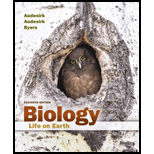
Concept explainers
Which of the following is not true of a single
a. It is usually caused by a translocation mutation.
b. It is usually caused by a nucleotide substitution mutation.
c. It may change the
d. It is inherited from parent to offspring.
Introduction:
Single nucleotide polymorphisms (SNPs) are a type of mutation in which one nucleotide at a particular position on deoxyribonucleic acid (DNA) is replaced by another nucleotide. SNPs are responsible for a number of genetic disorders in humans.
Answer to Problem 1MC
Correct answer:
SNPs cannot be caused by a translocation mutation.
Explanation of Solution
Justification/Explanation for the correct answer:
SNPs are caused by the replacement of one nucleotide at a particular position on the DNA by another nucleotide. Translocation refers to the rearrangement of segments of chromosomes, meaning that a particular segment of a chromosome breaks off from its location and reattaches at a new location. Option (a) is given that SNPs are usually caused by translocation mutations is a false statement. Hence, option (a) is correct.
Explanation for the incorrect answer:
Option (b) is given that SNPs are caused by nucleotide substitution mutations is a false statement. SNPs are caused by the substitution or replacement of a particular nucleotide at a given position with a different nucleotide. So, it is an incorrect option.
Option (c) is given that SNPs may change the phenotype of an organism is a false statement. SNPs can be of two types: synonymous and nonsynonymous. In a synonymous SNP, the amino acid coded by the triplet is not changed and the same protein is made. In a nonsynonymous SNP, the amino acid encoded by the triplet changes and an altered protein is made. This altered protein would give a different phenotype to the affected individual. So, it is an incorrect option.
Option (d) is given that SNPs are inherited from parent to offspring is a false statement. SNPs are changes in the DNA. Any change in the DNA of the parent will be passed on to his/her offspring because DNA is the basis of inheritance. So, it is an incorrect option.
Hence, options (b), (c), and (d) are incorrect.
Therefore, it can be concluded that SNPs are substitutions of a single nucleotide at a particular position by another nucleotide. They are passed on from the parent to the offspring and may alter the phenotype of the individual.
Want to see more full solutions like this?
Chapter 14 Solutions
BIOLOGY:LIFE ON EARTH-W/ACCESS
- Which statement about the neutral-mutation hypothesis is true? a. All proteins are functionless. b. Natural selection plays no role in evolution. c. Many molecular variants are functionally equivalent. d. All of the abovearrow_forwardAre the following examples a description of genetics at the molecular, cellular, organismal, or populational level? A. People with cystic fibrosis have lung problems due to a buildup of mucus in their lungs B. The mutant CF gene encodes a chloride transporter that doesn't transport chloride ions very well. C. A defect in the chloride transporter causes a salt imbalance in lung cells.arrow_forwardIf DNA of a particular species was analyzed and it was found that it contains 27 percent A, what would be the percentage of C? a. 27 percent b. 30 percent c. 23 percent d. 54 percentarrow_forward
- a. Which gene is mutated in individuals with sickle-cell anemia? b. What are the major symptoms of this disorder? c. What was the first published scientific description of sickle-cell anemia? d. Describe two other features of this disorder that you learned from the OMIM database and state where in the database you found this informationarrow_forwarda mutation in dna that adds +1 ot -1 nucleotide or +2 or -2 nucleotides is called a______? (choose one answer only) A. frameshift mutation B. silent mutation C. nonsense mutation D. missense mutationarrow_forwardA geneticist interested in immune function induces random mutations in a number of specific genes in mice and then determines which of the resulting mutant mice have impaired immune function. This procedure is an example of a. forward genetics. b. reverse genetics. c. both forward and reverse genetics. d. neither forward nor reverse geneticsarrow_forward
- Segmental duplications play an important role in evolution by a. giving rise to new genes and multigene families. b. keeping the number of genes in a genome constant. c. eliminating repetitive sequences produced by transposition. d. controlling the base content of the genome.arrow_forwardRefer to Figure 2 and compare this with the DNA model in Figure 1. a. In what ways are they similar? b. In what ways are they different? c. What is the biological significance of such differences? Why is the DNA referred to as the genetic material?arrow_forwardBefore the advent of recombinant DNA technology, why was it so diffcult for geneticists to map human genes using pedigrees? How did recombinant DNA technology help move things forward?arrow_forward
- A contig is a. a set of molecular markers used in gene mapping. b. a set of overlapping fragments that form a continuous stretch of DNA. c. a set of fragments generated by a restriction enzyme. d. a small DNA fragment used in sequencing.arrow_forwardAre gene mutations caused by selective pressures in the environment? In other words, do gene mutations arise in an organism out of need or want? Group of answer choices A. No, because gene mutations are not purely random. B. Yes, because gene mutations are not purely random. C. No, because gene mutations are purely random. D. Yes, because gene mutations are purely random.arrow_forward1. What is an allele? 2. What is a point mutation? 3. How are point mutations related to alleles? Use these sites to find the answer please: https://www.britannica.com/story/whats-the-difference-between-a-gene-and-an-allele http://rosalind.info/glossary/point-mutation/arrow_forward
 Human Heredity: Principles and Issues (MindTap Co...BiologyISBN:9781305251052Author:Michael CummingsPublisher:Cengage Learning
Human Heredity: Principles and Issues (MindTap Co...BiologyISBN:9781305251052Author:Michael CummingsPublisher:Cengage Learning
